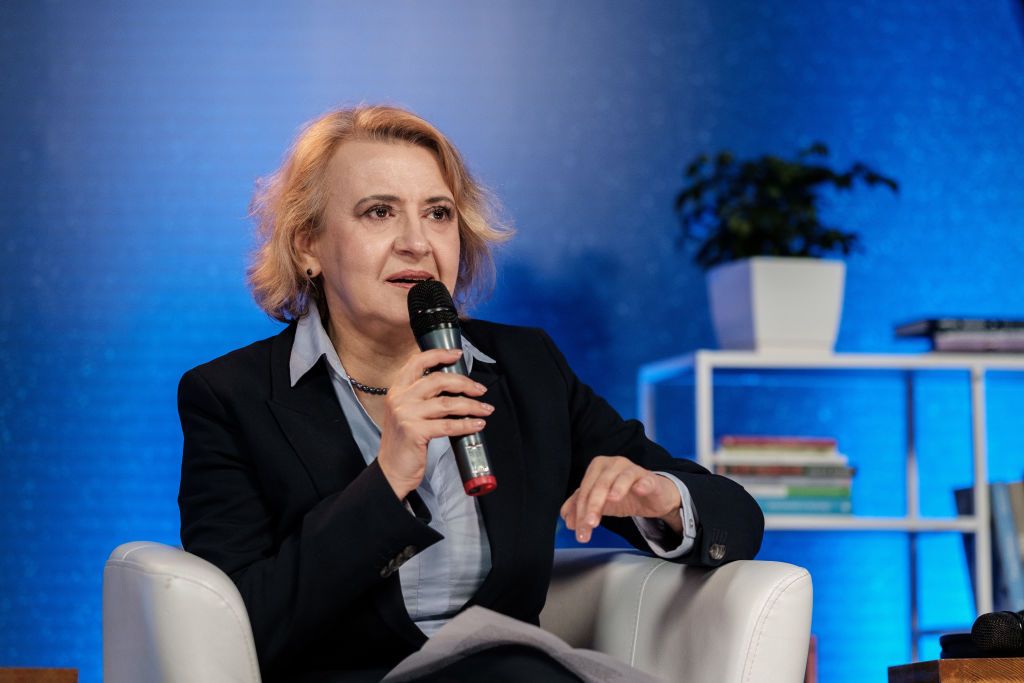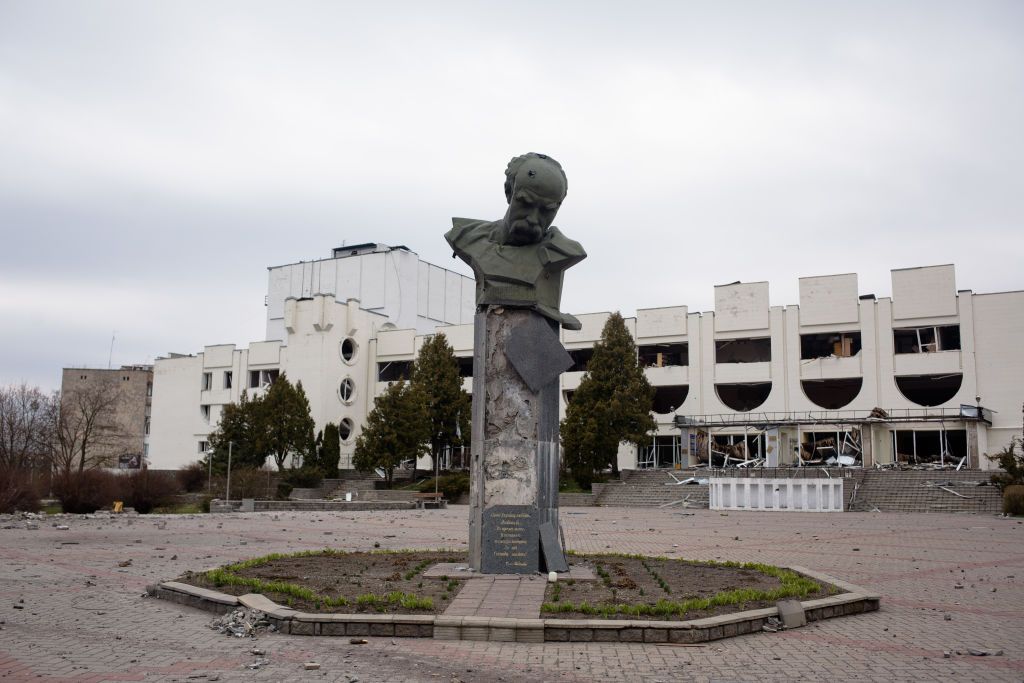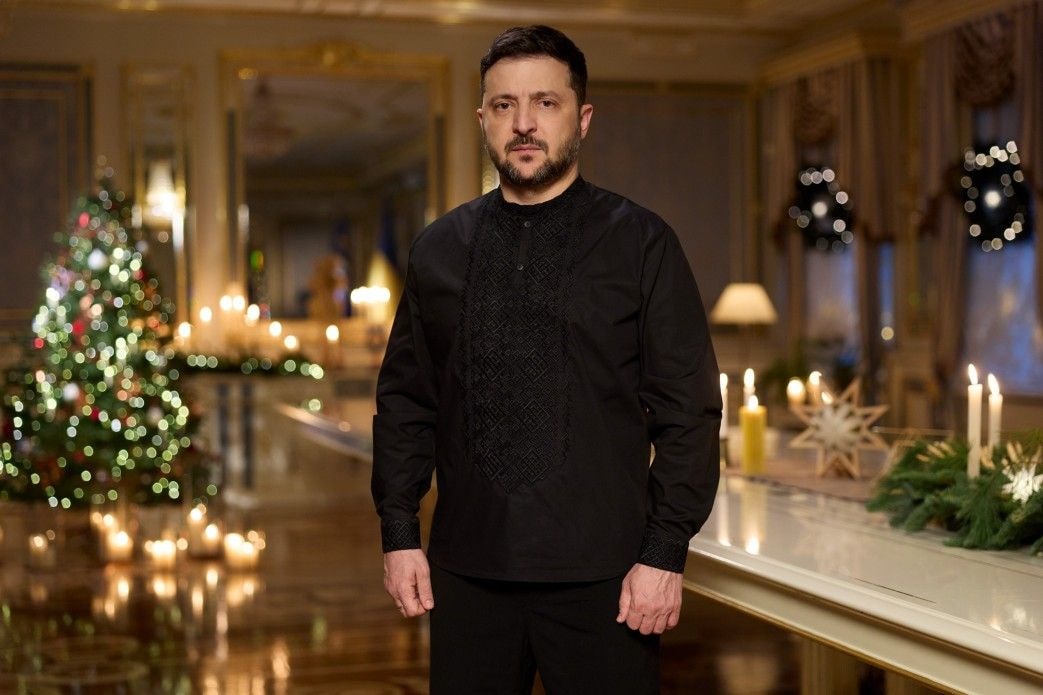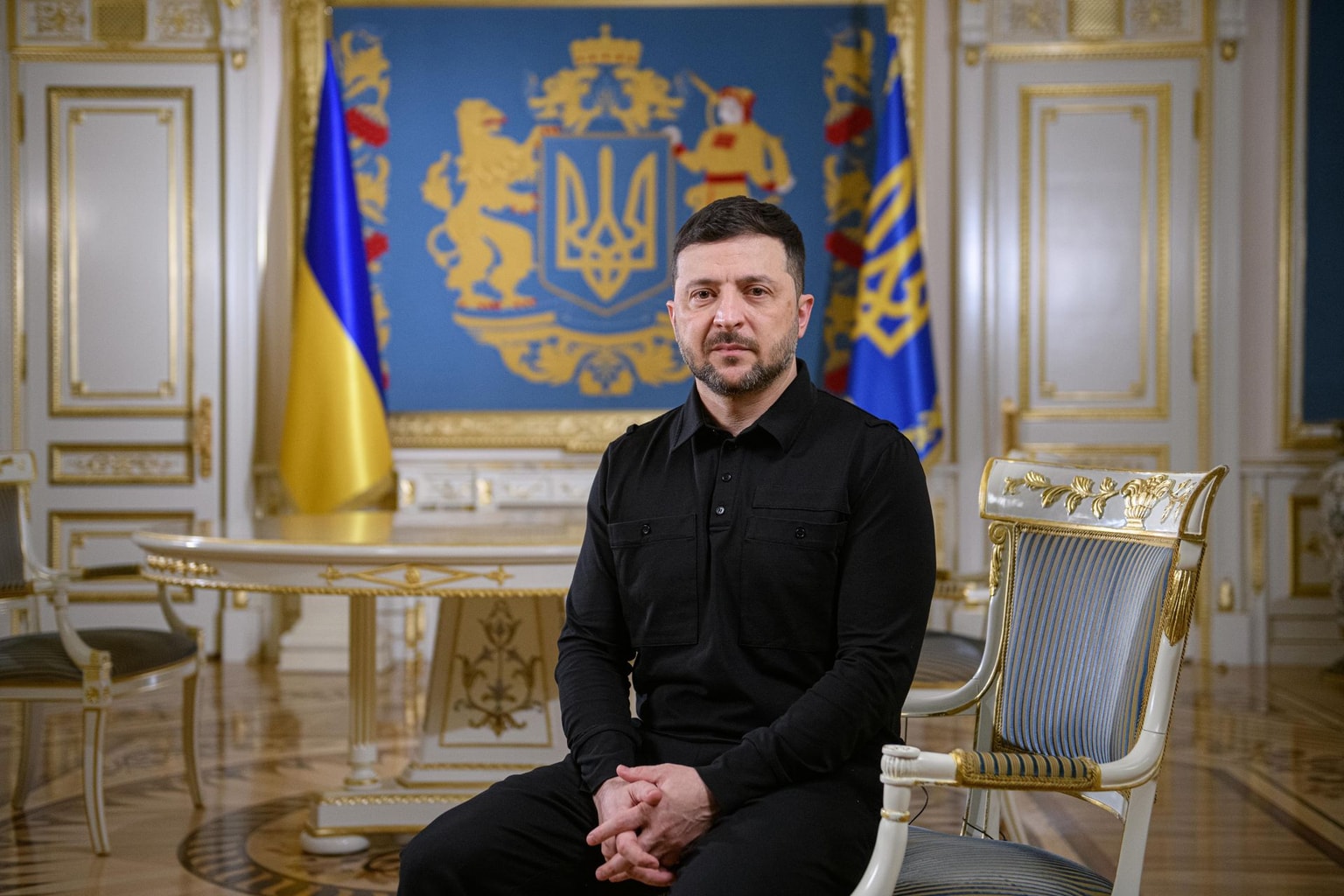10 books to better understand wartime Ukraine

Ukraine’s authors should have been able to dedicate their lives to honing their craft. Instead, many of them have stepped up to contribute to the war effort and fight back against Russian aggression.
Like any other member of society, Ukrainian authors have lost loved ones and colleagues to Russia’s war, with the understanding that they could be next. Russia has a centuries-long history of trying to erase Ukraine’s culture – that's why Ukrainian authors’ literary output should be cherished now more than ever.
And their perspectives are no less valuable than those of foreign correspondents or think tank fellows whose views sometimes have a greater reach among international audiences.
As Russia’s full-scale invasion of Ukraine enters another year, the human stories that drive forward the necessity of Ukraine’s victory risk being overshadowed by geopolitical narratives, as they did a decade prior. Delving into Ukrainian books can help readers reconnect with Ukraine’s struggle, evoking a renewed sense of empathy and providing sometimes overlooked context.
The demand for Ukrainian literature has surged since the beginning of Russia’s full-scale invasion in February 2022. Understanding which books are worth your time might seem overwhelming, given the number of choices available. In this list, the Kyiv Independent highlights a number of Ukrainian fiction, non-fiction, and poetry books already available in English translation to help you understand the war better.
If you’re looking to expand your list of books to read, the Kyiv Independent also regularly publishes book reviews on the latest releases relating to Ukraine and the surrounding region.
‘The Torture Camp on Paradise Street’ by Stanislav Aseyev
translated by Zenia Tompkins and Nina Murray
Journalist and writer Stanislav Aseyev stayed behind in his native Donetsk after Russian forces took control in 2014 to report for Ukraine and the world, under a pseudonym, what life was like under Russian occupation. He was kidnapped in June 2017, falsely accused of espionage, and spent over two years in the notorious Izolyatsia prison, a former arts center that Russian occupation forces transformed into a living hell on earth. The prison still operates to this day.
Aseyev recounts in this pivotal work the psychological and physical torture he and his fellow inmates, many of them civilians, endured daily at the hands of Russian occupation forces and collaborators. He also delves into the crisis of faith that naturally stems from electric shock torture, beatings, and rape surrounding someone. At the same time, he also conveys how dark humor can aid in coping even with these difficult experiences. Upon regaining his freedom, Aseyev shares his struggle to reintegrate into society, knowing that such horrors continue for others.
“The Torture Camp on Paradise Street” is required reading to get a glimpse of the reality and risks faced by countless Ukrainians still living under Russian occupation and in captivity, especially when words like “negotiations” and “concessions” are casually being thrown around in public discourse.
‘Mondegreen’ by Volodymyr Rafeyenko
translated by Mark Andryczyk
Known for years as a Russophone Ukrainian writer, Volodymyr Rafeyenko made a promise to himself to write a novel in Ukrainian after he was forced to flee his native Donetsk in 2014, not wanting to be associated with the so-called Russian world that used people like him to “justify” the war in Ukraine. That novel, “Mondegreen,” follows Haba Habinsky, a Russian-speaking professor from Donetsk who is also forced to start fresh in Kyiv after his home falls under Russian occupation. Struggling to find his place in the capital, he lands a job working in a supermarket and tries to communicate exclusively in Ukrainian.
Amid the sentiments of detachment and disorientation that have come to define his life, Habinsky gets lost in reflections on the near and distant past, including how once-familiar faces became enemies after the Russian occupation of Donetsk, as well as how his own family was impacted by Soviet authorities’ efforts in the early 20th century to wipe out Ukrainian culture in the Donbas region through violence and terror. "Mondegreen" is a captivating read, shedding light on internally displaced persons from the east, a segment of Ukrainian society often brought up in talking points but not always heard directly.
‘Apricots of Donbas’ by Lyuba Yakimchuk
translated by Oksana Maksymchuk, Max Rosochinsky, and Svetlana Lavochkina
Hailing from the coal-mining city of Pervomaisk in Luhansk Oblast, the poet Lyuba Yakimchuk’s collection “Apricots of Donbas” is a cri de coeur for her native Donbas region ravaged by 10 years of Russia’s war and the suffering Russia has inflicted upon those who call it home. Yakimchuk conveys this sense of loss not only through the imagery of families whose deaths are reduced to mere statistics or the homes that once held a lifetime of memories standing as testaments to what was left behind. She also explores the destruction of war on a linguistic level, with declarations like “don’t talk to me about Luhansk / it’s long since turned into hansk” and “I have gotten so very old/no longer Lyuba/just a ba.” Her verses are provocative, occasionally intimate and playful – such as when she pushes back against gender stereotypes – and intertwined with the notion of home, which is made even more poignant by the ongoing plight of displacement.
‘Carbide’ by Andriy Lyubka
translated by Reilly Costigan-Humes and Isaac Stackhouse Wheeler
A drunken history teacher with delusions of grandeur throws in his lot with local criminals to make his dream a reality: to build a tunnel under Ukrainian Transcarpathia’s border with the EU and smuggle all 40-plus million Ukrainians into Europe. While his motivation is sincere, the criminals have plans of their own on what to do with the tunnel.
Published shortly after the 2013-2014 EuroMaidan Revolution, "Carbide," Andriy Lyubka’s debut novel, is a satirical and heartfelt take on the challenges faced by Ukraine as it attempts to move closer toward European integration. Beneath the anti-hero’s humorous facade lies a deeper narrative, exposing the hardship inflicted upon Ukraine by years of Russian influence. Since the book’s publication, Ukraine has achieved some significant political breakthroughs, like visa-free travel in the EU, but the novel remains as urgent as ever in light of neighboring countries like Hungary doing everything they can to obstruct Ukraine’s EU membership.
‘The Orphanage’ by Serhiy Zhadan
translated by Reilly Costigan-Humes and Isaac Stackhouse Wheeler
Serhiy Zhadan’s “The Orphanage” centers on a Ukrainian family in Donetsk at the start of the war in 2014. The main protagonist is Pasha, a Ukrainian teacher who must embark on a dangerous mission into Russian-occupied territory to rescue his nephew Sasha from the orphanage where he resides.
Amid the escalating anxiety of war and societal collapse, Pasha grapples with the question of what it means to be Ukrainian. Before the outbreak of the war in 2014, he worked as a Ukrainian teacher yet seldom used the language outside the classroom, and he did not take an active interest in politics. Yet, Pasha’s encounters with various people along this journey to reunite with his nephew lead him to realize that each person has a choice to make within the country they call home, and that such choices are not always simple. Zhadan’s succinct prose encourages clear thinking, unity, and empathy — qualities that can lead a country from the darkest times to a better tomorrow.
‘The Dreamtime’ by Mstyslav Chernov
translated by Peter Leonard and Felix Helbing
Best known for his work as a photojournalist and having documented the fall of Mariupol at the outbreak of the full-scale Russian invasion, Pulitzer Prize-winning journalist Mstyslav Chernov relied on what he witnessed during his years of reporting on the front line to portray the brutally realistic stories that make up his psychological novel “The Dreamtime.”
The interwoven stories document the start of the war in the Donbas region in 2014 and include characters like K., a guilt-ridden doctor who volunteers his services, forcing himself to witness the outbreak of Russia’s war firsthand. This leads him to pivotal events from that early period, such as the Russian downing of flight MH17. As he witnesses the charred remains of people who led individual lives with hopes and dreams, his eyes refuse “to compute the familiar objects and features.” A long, frightening, yet necessary read, “The Dreamtime” underscores how war is the one nightmare you can’t wake up from.
‘Grey Bees’ by Andrey Kurkov
translated by Boris Dralyuk
In “Grey Bees,” the protagonist Sergey Sergeyich and his bees are the only inhabitants left in his village, along with his “frenemy” Pashka. Their village is located in the so-called Grey Zone, a no man’s land separating Ukrainian- and Russian-controlled areas along the front line in Donbas. Sergey, who ironically resides on Lenin Street, strikes up a friendship with a Ukrainian soldier who occasionally passes through, while Pashka, who calls Shevchenko Street home, is friendly with Russian forces.
Despite Sergey Sergeyich’s displays of kindness to the Ukrainian soldier, including checking up on him to make sure he’s alive, our protagonist’s primary devotion seems to lie with his bees. After all, their world is far more logical and less cruel than the human world surrounding them.
But after Sergey Sergeyich transports his bees to Russian-occupied Crimea in pursuit of a more favorable climate that is free from the threat of constant shelling, he becomes a witness to the harsh repression inflicted by Russian occupation authorities upon locals, namely the peninsula’s indigenous people, Crimean Tatars, and tries to help them to make their world a little less gray.
‘Absolute Zero’ by Artem Chekh
translated by Oksana Lutsyshyna and Olena Jennings
Ukrainian writer-turned-soldier Artem Chekh rose to worldwide prominence for his somber op-eds “I’m a Ukrainian Soldier, and I’ve Accepted My Death” and “I Spent Five Days in a Trench Waiting for Death. It Was Pure Hell” in The New York Times during the full-scale invasion, but he was no stranger to war before 2022. From 2015 to 2016, Chekh served as a senior rifleman and gunner of an armored troop carrier in the Armed Forces of Ukraine.
“Absolute Zero” is a series of vignettes recounting his military experience during that period. The book is notable for its stark refusal to portray war in an idealized manner, as well as its glimpses of military life between battles, including the differing socio-economic dynamics between soldiers. For instance, there's Chekh, the cosmopolitan from Kyiv, who could afford to buy top-notch boots, in contrast to less affluent, working-class individuals stuck with uncomfortable standard-issue footwear.
Despite the sometimes bleak nature of the book, Chekh doesn’t fail to overlook war’s more humorous moments, like when a kitten with cerebral palsy goes from bringing joy to chaos in the barracks. “Absolute Zero” is a glimpse into the daily reality for Ukraine’s defenders at the very start of Russia’s war.
‘The Death of a Soldier Told by His Sister’ by Olesya Khromeychuk
Almost every Ukrainian has a personal story of loss 10 years into Russia's war. U.K.-based historian and author Olesya Khromeychuk’s life changed forever in 2014 when Russia invaded her homeland, and irrevocably so in 2017 when her older brother Volodymyr was killed while serving on the front lines. Yet, “The Death of a Soldier Told by His Sister” is more than just a reflection on her relationship with her brother.
The memoir addresses a number of more wide-ranging topics, including how to study war with the impartiality expected of a historian when it impacts you directly, and why broad, sweeping statements about fallen heroes don’t always carry the same weight as the personal memories of those who knew them, ultimately raising important questions about public memory and mourning. It also aptly explores why Ukrainians like Volodymyr volunteered to fight, and how they saw that the 2014 invasion of Donbas was a threat to all of Europe.
‘77 Days of February: Living and Dying in Ukraine’
translated by Dmytro Kyyan and Kate Tsurkan
What do a family who stayed home during the siege of Chernihiv and took care of over 20 local cats, a single mother who braved the days-long lines at the Ukrainian-Polish border to get her infant child to safety, the attendants of a mental asylum in a village near Chernihiv that had to maintain a semblance of normalcy for their patients, and the theater troupe in Lviv that transformed their space into a haven for refugees have in common? They all did what they could to maintain their dignity and humanity during the terrifying early days of Russia's full-scale invasion of Ukraine. This collection of narrative journalism from reporters at The Ukrainians media, which features a compelling foreword by author Serhiy Zhadan, examines the first few weeks of the full-scale invasion from the perspectives of Ukrainian civilians. Through the stories in "77 Days of February," readers can gain new insight into how deeply the full-scale invasion has impacted daily life in Ukraine and the extent to which ordinary Ukrainians have truly persevered against Russia’s war.

Note from the author:
Hi, this is Kate Tsurkan, thanks for reading this listicle There is an ever-increasing amount of books about Ukraine available to English-language readers, and I hope my recommendations prove useful when it comes to your next trip to the bookstore. Ukrainian culture has taken on an even more important meaning during wartime, so if you like reading about this sort of thing, please consider supporting The Kyiv Independent.













